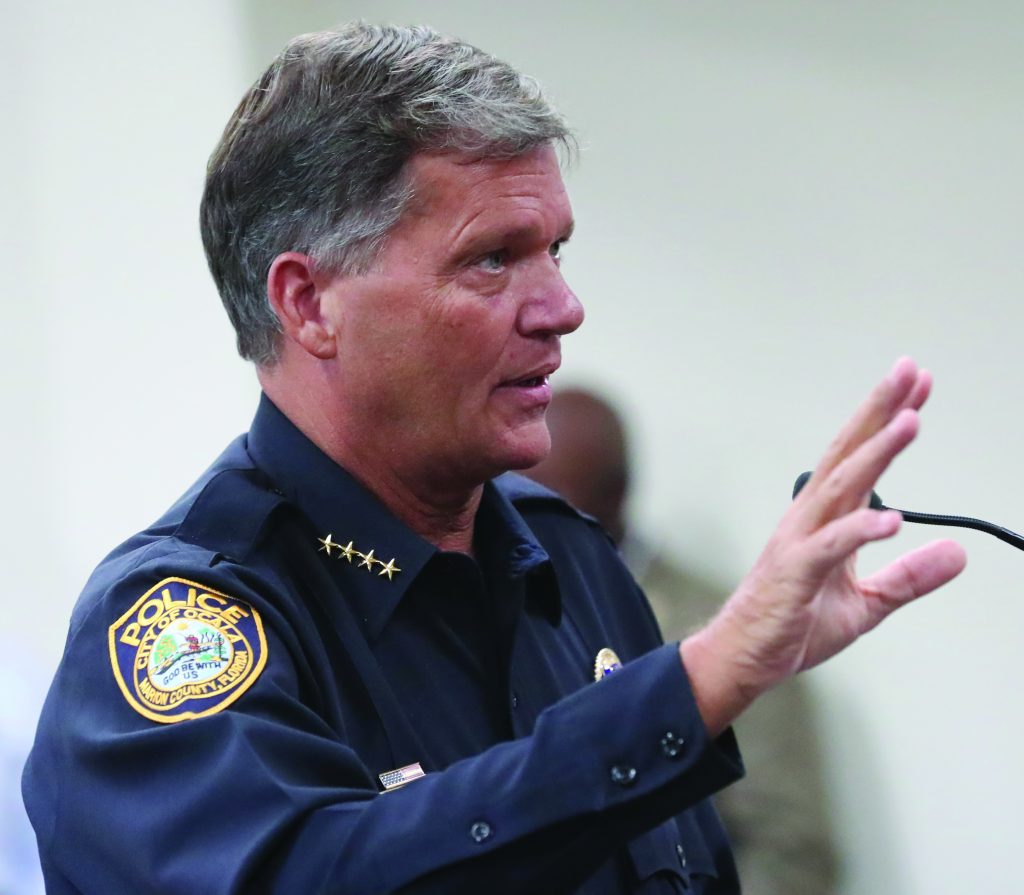Amid pandemic, Marion deals with another killer

Ocala Police Chief Greg Graham speaks against an emergency ordinance to require face coverings during the Ocala City Council meeting at Ocala City Hall in Ocala, Fla. on Tuesday, July 21, 2020. The City Council voted 3-2 against the emergency mask ordinance suggested by Councilman Matt Wardell that would have required people in Ocala to wear face coverings in indoor locations amid the COVID-19 pandemic. [Bruce Ackerman/Ocala Gazette] 2020.

Ocala Police Chief Greg Graham. [Bruce Ackerman/Ocala Gazette] 2020.
So far this year, the city of Ocala has seen 223 opioid overdoses, Police Chief Greg Graham said. And there are still four months of the year to go. The most opioid overdoses the Ocala Police Department has recorded in a single year prior to 2020 was in 2018, when the city had 182 overdose cases.
Deaths are also up. So far this year, OPD has reported 28 opioid overdose deaths and the Marion County Sheriff’s Office has reported 66 deaths, both up over all of last year – and, again, there are still four months left in 2020.
“We’re seeing a spike this year,” Graham said. “It’s probably due to the quarantine.”
Yet, while Ocala/Marion County is seeing a rise in opioid deaths during a pandemic, the veteran police chief believes our community is ahead of most communities in confronting the opioid crisis.
Through the Heroin/Opioid Task Force, formed by the Marion County Children’s Alliance, the community has instituted a number of programs to battle opioids. Among them is an extensive Narcan distribution and education program led by The Centers. Narcan is a nasal spray that reverses an overdose. The Task Force also coordinates regular meetings of civic groups that have a role in battling the opioid scourge. Finally, Graham’s agency has created an amnesty program through which anyone with an opioid addiction can walk into an OPD office and ask for treatment and get it, no questions asked.
“I think our community is leading the way on this,” Graham said. “We put a pretty significant effort into this.”
OPD is the first law enforcement agency in Florida to indict an opioid dealer on murder charges, and Graham said there are other similar cases “in the pipeline” locally.
As for the amnesty program, Graham said since its inception three years ago 311 people have sought OPD’s help. Of the 311 people who have entered the program, the chief said 78 percent have finished, and of that 78 percent, 57 percent are still clean.
“We never though we’d have those kinds of numbers, Graham said.
“Think how bad the problem is in Marion County – 300 people walked into the police station and asked for help. How many are out there who aren’t asking for help?”
Graham believes opioid abuse is so pervasive in Ocala/Marion County that it is a greater threat than the coronavirus or mass shooters.
“This is what’s killing our citizens,” he lamented.
Graham said for all the public education and success the community is seeing as it battles opioid abuse, many people wrongly attribute opioid addiction to bad personal decisions when, in reality, most opioid addicts got hooked as a result of a physician over-prescribing painkillers.
“Some people think we should let them die, that it’s a moral choice,” he said. “And it’s not.”
Meanwhile, Graham sees the attention and resources being devoted to the coronavirus and wonders where the public concern is over the opioid crisis in our community.
“Three hundred people have died in the past four years here to opioids,” he said. “Where’s the moral outcry?”





